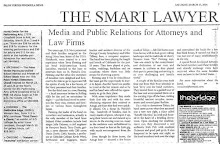In Michigan, ‘old media’ are lining up to attack and pillory a Legislative proposal to create a voluntary registry for journalists. Such a registry would allow the public to determine exactly who is calling themselves a journalist, and what their qualifications are to do that.
The news media’s objections to the idea have not been subtle. The idea has been labeled ridiculous and unconstitutional right out of the gate. For better or worse, the idea touched a nerve. And it touched a nerve with the very people who own the barrels of printers ink.
Why should we as attorneys care about questions of journalistic qualification? Well, for starters, journalists have a myriad of special privileges that most people do not enjoy. They enjoy access to people and places, special legal status, and a reputation for being bound by ethical rules and a duty to the public. You take their calls.
Yesterday a colleague shared this story. A few months ago a very well respected bar association was contacted via phone by a journalist. The journalist asked loaded, leading questions that the bar spokesperson wisely refused to answer off the cuff, requesting to gather the needed information and call this journalist back.
Well, after a bit of investigation the “journalist” turned out to be no journalist at all, but a layperson with an amateur blog and a personal axe to grind. This blogger had made it past a couple levels of gatekeepers and been allowed to chat with the spokesperson, all based upon his self-adopted label: “journalist.”
A similar thing happened to me last week. A pushy middle-aged man, dressed in shorts and a t-shirt, describing himself as ‘a journalist,’ came into our lobby with no appointment and began asking our receptionist strange questions in a rude tone.
“Since our members are attorneys, didn’t we have an obligation to allow the public and journalists to attend our private board meetings?” “Since we had [certain words] in the name of our organization, didn’t that imply we had Constitutional obligations to the public??” “Didn’t the First Amendment give [our casually dressed friend] the right to attend our [private] Board meetings, ask for copies of our Board minutes, and generally hang out and pepper us with questions as long as he felt necessary?!?” And, “when could he be allowed to address our leadership to air his grievances regarding our answers to his last few questions???!”
I was quietly asked to come out and ‘handle’ our concerned visitor. I listened to his questions patiently and tried to answer them. But whenever this self-proclaimed journalist made incorrect [frankly, ‘bizarre’ describes them better] assumptions as part of framing his questions, I calmly corrected his misconceptions.
It took all of three minutes for my journalistic friend to storm out of the door without so much as a thank you or goodbye.
Say what you will about First Amendment press protections, but in this new age of ranting bloggers and self-appointed amateur “journalists” I’d sure like to have had some sort of registry to find out who this man was, and through what media affiliation he felt the right to label himself a journalist.
[See another perspective on the problem of news, the Internet, and what is left of journalism in the June 2, 2010 Atlantic ]
Your reputation is your most valuable asset
Attorneys beware: who is that ‘journalist’ on the phone?
Subscribe to:
Post Comments (Atom)







2 comments:
Did merely saying you are a journalist ever entitle you (as journalist) to "access", or require that you (as interviewee) respond? If so, I have been missing out on a good thing and I am going to add "journalist" to my business card at once.
I guess I would always be dubious of someone's bona fides.
If we require resgistering of journalists, would this require that you grant access to a registered journalist?
A database would be nice, but some legal requirement to register? I am again dubious.
Actually: yes. Most people respond automatically to requests by a journalist and when I was a working reporter I rarely had my identity questioned in person and even less frequently over the phone. People took my calls and started talking.
Pretending to be a journalist to gain access is one of the oldest con-man scams you'll see in TV and the movies.
No idea what the details of a 'registration' would look like, but obviously no private citizen --even we attorneys-- ever has to respond to a journalist. It is a good idea to do so however.
Post a Comment